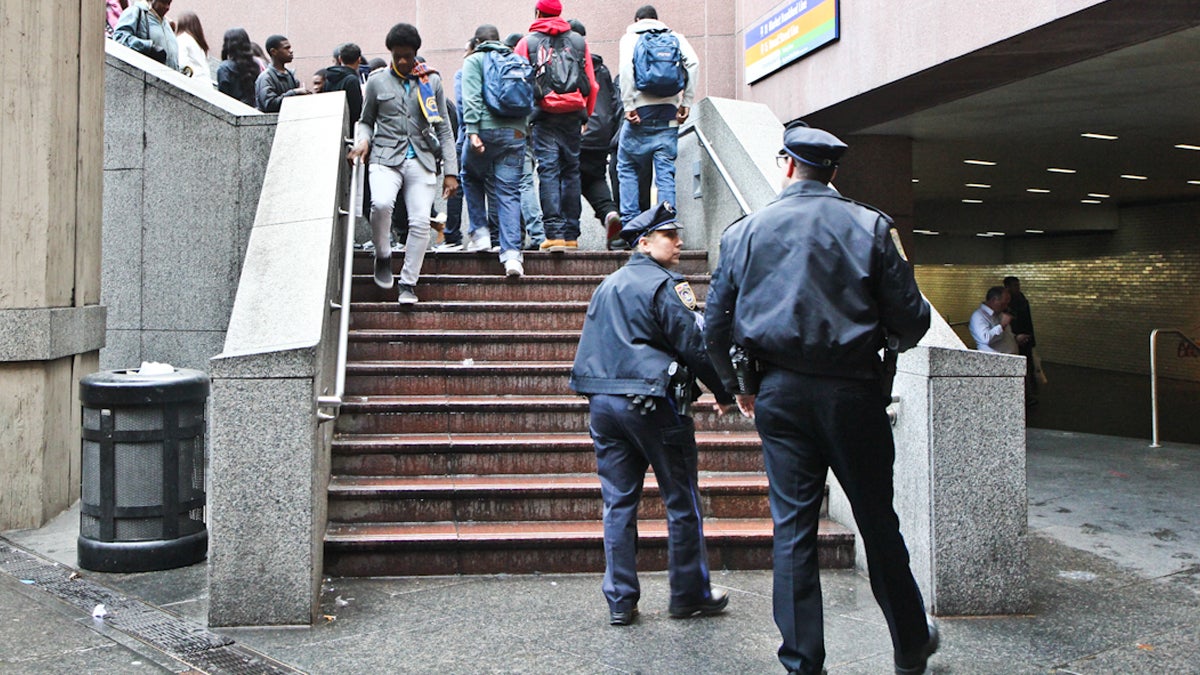SEPTA police union says a catch and release policy endangers officer safety
SEPTA’s police union is calling on agency officials to reverse a policy that delays the arrest of alleged criminal offenders on the SEPTA system.

SEPTA Police watch Philadelphia students as they exit a subway concourse in Center City. (Kimberly Paynter/WHYY)
SEPTA’s police union is calling on authority officials to do away with a policy that delays the arrest of alleged criminal offenders on the SEPTA system.
SEPTA law enforcement officials implemented the policy in late August after a malware attack on authority servers delayed access to the city’s police arrest processing database, video surveillance footage, and officers’ body-worn camera footage.
As a result, the department directed transit officers who had probable cause for a misdemeanor or felony arrest to apprehend the alleged offender, conduct an investigation on the scene, offer the suspect a chance to give a statement to detectives, confirm the suspect’s identification, transport them away from the scene to a city police precinct, then release them there.
The information gathered during the process is then sent to investigators to follow up with a possible warrant for arrest though some exceptions have been and can be made, particularly where “the likelihood of a repeat occurrence is higher,” said Thomas Nestel, SEPTA Transit Police Chief. “The decision is made based on the individual facts of the case.”
In the six months since the policy changed, transit police have seen access to surveillance cameras and the city arrest database restored. Access to body worn camera footage after August 2020 has been restored, but delayed. Still, authority police have no plans to end the policy.
“As time passed, the department recognized the benefit of this process, as it provides detectives with the opportunity to do a more thorough investigation,” Nestel said.
The police chief said the method has made investigations more efficient, reducing the amount of time it takes to get an arrest warrant approved and the number of cases rejected by the District Attorney’s office.
“The process does not give offenders a pass,” Nestel said. “It gives police the chance to develop a better case.”
The police union listed nine separate violent offenses between October 2020 and February 2021 against SEPTA police, employees, and riders that resulted in the suspect being released with the intention to possibly arrest them later via warrant. Only one arrest was confirmed by the union.
In one episode in January, a man allegedly assaulted two police officers, punching one in the face and kicking another in the chest, sending him to the hospital. This was the only suspect listed that transit police union president Omari Bervine could confirm as arrested.
In another incident in February, an offender was alleged to have punched a Route 52 bus operator repeatedly in the face and on the body.
SEPTA did not have data of physical assaults and violent crime immediately available, but employees reported 174 incidents of violence last year.
Bervine wrote a letter on behalf of the union to SEPTA general manager Leslie Richards late last month. In it, he denounced the policy, saying it makes officers’ jobs “even more dangerous” and “needlessly endangers the welfare” of riders.
“It’s just beyond comprehension why anybody would believe that this is an effective policy for [reducing] crime,” said Bervine.

Get daily updates from WHYY News!
WHYY is your source for fact-based, in-depth journalism and information. As a nonprofit organization, we rely on financial support from readers like you. Please give today.







